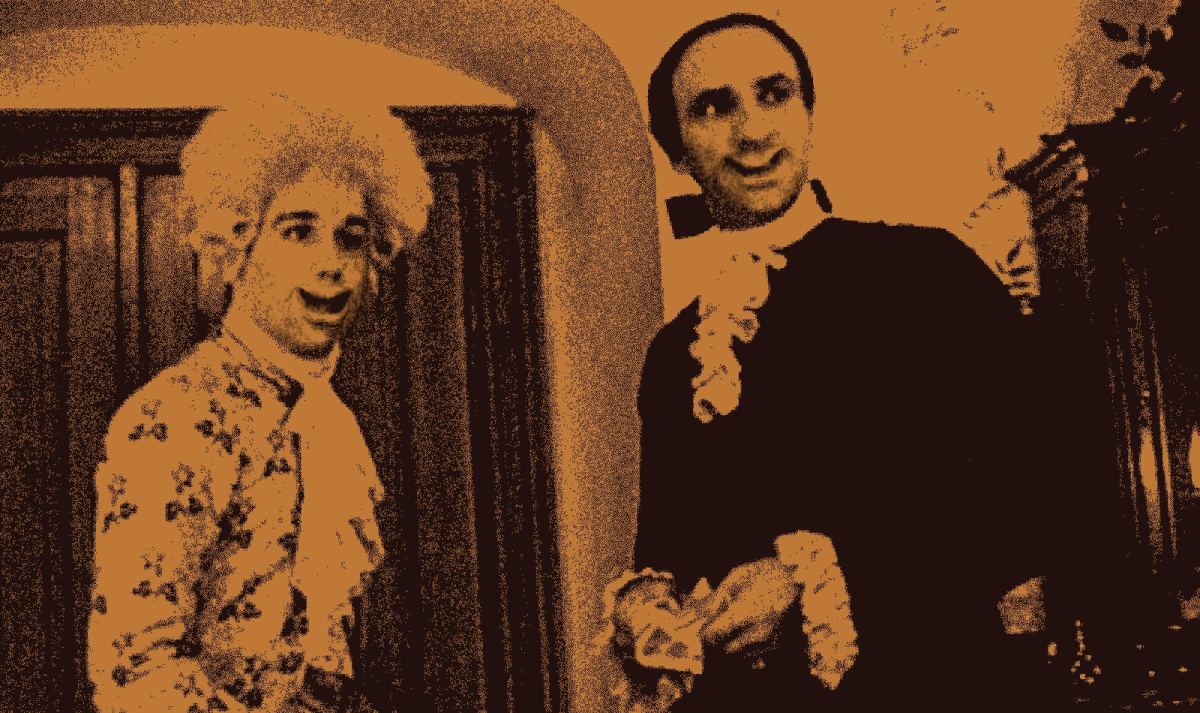Salieri has developed a habit of stealing Mozart’s scores. He looks at them in private, then puts them back the next day. One night Salieri attends an underground party and watches as Mozart ties up a woman. He feels a deep charge of erotic energy; he can’t sleep. Mozart confronts Salieri about the score-stealing, teasing. One night, Salieri returns to the club, now looking for Mozart. Mozart blindfolds him and ties him up. They have sex. Mozart praises Salieri’s music. Salieri finally comes to peace with his feelings of musical inferiority. Mozart smells spicy, Salieri’s perfume is mint.
Or: Salieri gets into a shouting match with a Count Rosenberg in front of his students. Rosenberg is angry because Salieri passed on a proprietary Da Ponte libretto to Mozart. Salieri meets Mozart at the club again, where they engage in rough, primal sexual play. Salieri’s pent up rage and stress dissipates. Mozart “reach[es] over toward the Italian composer’s hand. He lace[s] their fingers.”

Or: we’re in the present. Mozart and Salieri are pop stars. They’re supposed to sing a duet together at a charity benefit. Mozart has recently divorced Constanze. Salieri ends up giving Mozart a ride home. It’s awkward. We find out that Salieri has been cool and distant to Mozart since their last tryst. Mozart confronts Salieri about this; Salieri apologizes. Now at home in Mozart’s apartment, they declare their love for one another. They have sex. They fall asleep together.
Or: we’re still in the present, now at a college. Mozart and Salieri have French class. The professor tells them to practice a dialogue together. Salieri is wearing a leather tie. Mozart finds this irresistible. In bad French, he tells Salieri how suggestive the tie is. After class, Salieri invites Mozart out for a cup of coffee. They discuss plans for sex. At home, Salieri ties Mozart up with rope, tightening it until Mozart nearly loses consciousness, then bringing him to orgasm. They agree to start a Dom/Sub relationship, as long as, Salieri says, it doesn’t interfere with their composing.

Or we’re back in the past again, and Salieri and Mozart have started composing together, and one night, in a fit of musical passion, Mozart brandishes a dagger. Later, Salieri, on his way home, is ambushed by two men. He makes to hand over his purse of gold. Mozart arrives on the scene; surprising the muggers, he kills both of them. Back at their apartment, Salieri and Mozart feel tainted by the events, the blood on their hands. They feel like nothing matters. So they proceed to have kinky, rough sex.
In 2009, a musical called “Mozart L’Opéra Rock” premiered to mixed reviews in France. Le Figaro referred to its “mediocre sound, inconsistent book and indifferent casting.” It gained cult status anyway. Mozart x Salieri slash fan fiction, of which all of the stories above are examples, may be inspired by an (at least to American audiences) obscure and ridiculous rock opera. It also presents an appealing, important counter-narrative to classical music clichés about genius, talent, and our distance to the past.
I stumbled down the fantastically entertaining rabbit hole of Mozart x Salieri slash while wondering if there is a such thing as fan fiction about composers. Turns out there is, but very little—one website has been inactive since 2010, and was taken over by Russian spam, though there are a few promising bits and pieces still available there. (“Gian Carlo [Menotti] kissed Samuel [Barber] with all he had, and as he heard the resounding whimper from his lover’s lips, Gian Carlo’s face emptied of its melancholy.”)
There’s more “Mozart L’Opéra Rock” slash, and it seems to be a small but thriving niche. On Archive of Our Own, “A nonprofit organization established…to serve the interests of fans by providing access to and preserving the history of fanworks and fan culture in its myriad forms,” a search for Mozart Salieri returns 49 results, while Harry Potter gets 111,471. But that doesn’t mean “MOR” fan fiction shouldn’t be taken seriously. Reading over 60 pages of slash for this piece, I gained an appreciation for the stories as entertaining works of passionate, engaged fandom that are extremely liberating in their approach.

It’s important to remember that this writing is related to the rock opera specifically (though I don’t think that means it’s irrelevant for classical music more generally). I reached out to Shiva Adler, who describes herself on her website as a “polyamorous genderqueer/bigender college graduate and writer” and “mezzo-soprano aspiring to become an Antonio Salieri book slapper.” In an email, she wrote me, “what incites the writing of that Mozart x Salieri slash is the fictional representation of them as shown in the movie ‘Amadeus’ and/or the rock opera and thus not the actual composers. Even though I use, while writing, tons of historical facts and my knowledge of music to fill the gaps the creators left in the respectively fictional representation of the composers, I am not in fact writing about the composers themselves.” (The Guardian gave “Amadeus” a D+ for historical accuracy. The rock opera is far more absurd.)
Which is why you should watch it. “Mozart L’Opéra Rock” is campy, trashy, and hilarious. Mozart wears eyeliner and skinny jeans; Constanze’s sister calls her a “c*nt,” and she responds by putting her fingers in her ears and sticking her tongue out; instead of a ponytail, Salieri has short chestnut hair and a great beard. Like the “Rocky Horror Picture Show,” you can imagine getting together with a bunch of people for a midnight showing, shouting things at the screen. Other lesbian fantasy stories I read involving Constanze, her sister Aloysia, and others were very fun.

But if it’s more appealing to imagine the actors from “MOR” having sex than the ones from “Amadeus” (they’re hotter), the realistic themes of Miloš Forman’s 1984 film are what make the sexual tension in all the stories resonate, and which make the slash with the two male leads the most potent. The theater actor Simon Cowell recalls in The Guardian that “I had seen [Paul Scofield, who played Salieri in the premiere] physically expand as he came on stage for dress rehearsals, but now, in front of an audience, he had become some sort of an animal, a panther or a tiger, prowling around in absolute contact with the audience, whose longing for him was almost embarrassingly carnal.”
“Mozart’s tongue started to explore, licking every corner of his mouth and soon he was ravished as the kiss became more carnal,” Adler writes in one story. After pages and pages of build-up, focusing on the two composers’ musical rivalry and Salieri’s complicated love and hate of Mozart’s personality, this feels believable. The slash plays to the fact that sex which feels safely “wrong” also tends to feel incredible.
In “Amadeus,” of course, Salieri’s jealousy destroys him and Mozart too. In Thomas Bernhard’s “The Loser,” the friendship of Glenn Gould causes one pianist to give his Steinway to an untalented teacher’s daughter and the other to kill himself. “If we encounter the best,” the narrator says, “we must give up.” Mozart x Salieri slash certainly doesn’t see it that way.
In the stories, the rivalry between the two composers leads to something far happier and more productive: first sex, then often a relationship, and particularly an acceptance from Salieri of his own talent. It’s not about the revenge of the mediocre anymore—instead, the mediocre Salieri learns to cope through good self-esteem. Mozart helps him relinquish control; the power dynamics of BDSM liberate Salieri from his self-inflicted doubts. He doesn’t quite come to the conclusion that he can equal Mozart through pure hard work, but he’s not far off either. It’s not a bad way for a musician to think about being in the world: that talent is only one part of the equation of success.

The film “Amadeus” is all about whom history remembers—the one in a million talent who changes the course of art. Slash fiction expands on limited moments, exploring latent tensions. It lives in the present. (Or the future; or an alternate universe.) To Salieri and by extension anyone worried about being mediocre, it says: You can’t decide who will make history in any case. Accept your talent and enjoy your life.
All except one slash piece I read builds steadily up to sex. But in the strongest one of the bunch, “Les oiseaux que l’on met en cage,” by Adler, the catharsis comes in the coda. “Salieri, listen to me,” Mozart says. “You will never trust a man as much as you trusted me tonight. You’ve given yourself to me, despite the turmoil of hatred towards yourself. You’re afraid, afraid not to be good enough, you suffer, you agonize and whilst you see failure I see something else.” ¶

